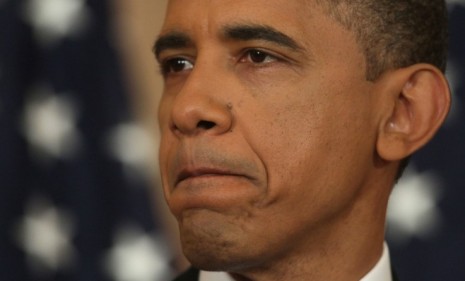Did Obama's Mideast speech crush hopes for peace?
Israeli and Palestinian leaders take turns lashing out at the president's proposals to revive Mideast peace talks. Now what?

A free daily email with the biggest news stories of the day – and the best features from TheWeek.com
You are now subscribed
Your newsletter sign-up was successful
Probably not the reaction President Obama was hoping for: Both Israeli and Palestinian leaders sharply criticized the Thursday speech in which Obama called for renewed Middle East peace talks. Hamas, the militant Islamist movement that runs Gaza, was angered by Obama's rejection of a bid to get the United Nations to recognize Palestinian statehood, and called his address "a total failure." Meanwhile, Israeli Prime Minister Benjamin Netanyahu, who is meeting with Obama in Washington on Friday, said Obama's proposal to return to the boundaries that were in place before the 1967 Arab-Israeli war — with some mutually agreed land swaps — would leave Israel with "indefensible" borders. Did Obama just destroy any hopes of a peace deal?
Throwing Israel under the bus won't bring peace: If anything, Obama has just set back the cause of peace, says William A. Jacobson at Legal Insurrection. The indefensible 1967 borders should not even enter the equation — they "simply were the armistice lines after the Arabs failed to drive the Jews into the sea." Obama is siding with the Palestinians' territorial demands, "without the Palestinians having to give anything in return," and fueled "the unacceptable narrative that Israel is the problem."
"Obama — Israel must withdraw to 1967 borders with land swaps"
The Week
Escape your echo chamber. Get the facts behind the news, plus analysis from multiple perspectives.

Sign up for The Week's Free Newsletters
From our morning news briefing to a weekly Good News Newsletter, get the best of The Week delivered directly to your inbox.
From our morning news briefing to a weekly Good News Newsletter, get the best of The Week delivered directly to your inbox.
Obama offered a fair starting point: Obama's vision contains plenty to "please and annoy almost all concerned parties," says Hussein Ibish in Foreign Policy. "But it was not a bad step forward." Obama needed to place the U.S. "more on the side of the aspirations of the Arab peoples than it ever has been in the past." He didn't reject, as Israel has, the Palestinian deal to form a unity government that includes Hamas, but he did put the onus on the Palestinians to demonstrate a "commitment to peace with Israel and the rejection of violence."
"Will Obama's speech change anything?"
To achieve real peace, the president must do more: It's about time Obama faced this problem head on, says The New York Times in an editorial. But his speech included "no game-changing proposal." Goading an ally like Israel to take risks won't be enough to break the stalemate. "Washington and its allies need to put a map on the table and challenge both sides to resume negotiations." That's "the best chance for peace."
A free daily email with the biggest news stories of the day – and the best features from TheWeek.com
-
 The Olympic timekeepers keeping the Games on track
The Olympic timekeepers keeping the Games on trackUnder the Radar Swiss watchmaking giant Omega has been at the finish line of every Olympic Games for nearly 100 years
-
 Will increasing tensions with Iran boil over into war?
Will increasing tensions with Iran boil over into war?Today’s Big Question President Donald Trump has recently been threatening the country
-
 Corruption: The spy sheikh and the president
Corruption: The spy sheikh and the presidentFeature Trump is at the center of another scandal
-
 The billionaires’ wealth tax: a catastrophe for California?
The billionaires’ wealth tax: a catastrophe for California?Talking Point Peter Thiel and Larry Page preparing to change state residency
-
 Bari Weiss’ ‘60 Minutes’ scandal is about more than one report
Bari Weiss’ ‘60 Minutes’ scandal is about more than one reportIN THE SPOTLIGHT By blocking an approved segment on a controversial prison holding US deportees in El Salvador, the editor-in-chief of CBS News has become the main story
-
 Has Zohran Mamdani shown the Democrats how to win again?
Has Zohran Mamdani shown the Democrats how to win again?Today’s Big Question New York City mayoral election touted as victory for left-wing populists but moderate centrist wins elsewhere present more complex path for Democratic Party
-
 Millions turn out for anti-Trump ‘No Kings’ rallies
Millions turn out for anti-Trump ‘No Kings’ ralliesSpeed Read An estimated 7 million people participated, 2 million more than at the first ‘No Kings’ protest in June
-
 Ghislaine Maxwell: angling for a Trump pardon
Ghislaine Maxwell: angling for a Trump pardonTalking Point Convicted sex trafficker's testimony could shed new light on president's links to Jeffrey Epstein
-
 The last words and final moments of 40 presidents
The last words and final moments of 40 presidentsThe Explainer Some are eloquent quotes worthy of the holders of the highest office in the nation, and others... aren't
-
 The JFK files: the truth at last?
The JFK files: the truth at last?In The Spotlight More than 64,000 previously classified documents relating the 1963 assassination of John F. Kennedy have been released by the Trump administration
-
 'Seriously, not literally': how should the world take Donald Trump?
'Seriously, not literally': how should the world take Donald Trump?Today's big question White House rhetoric and reality look likely to become increasingly blurred